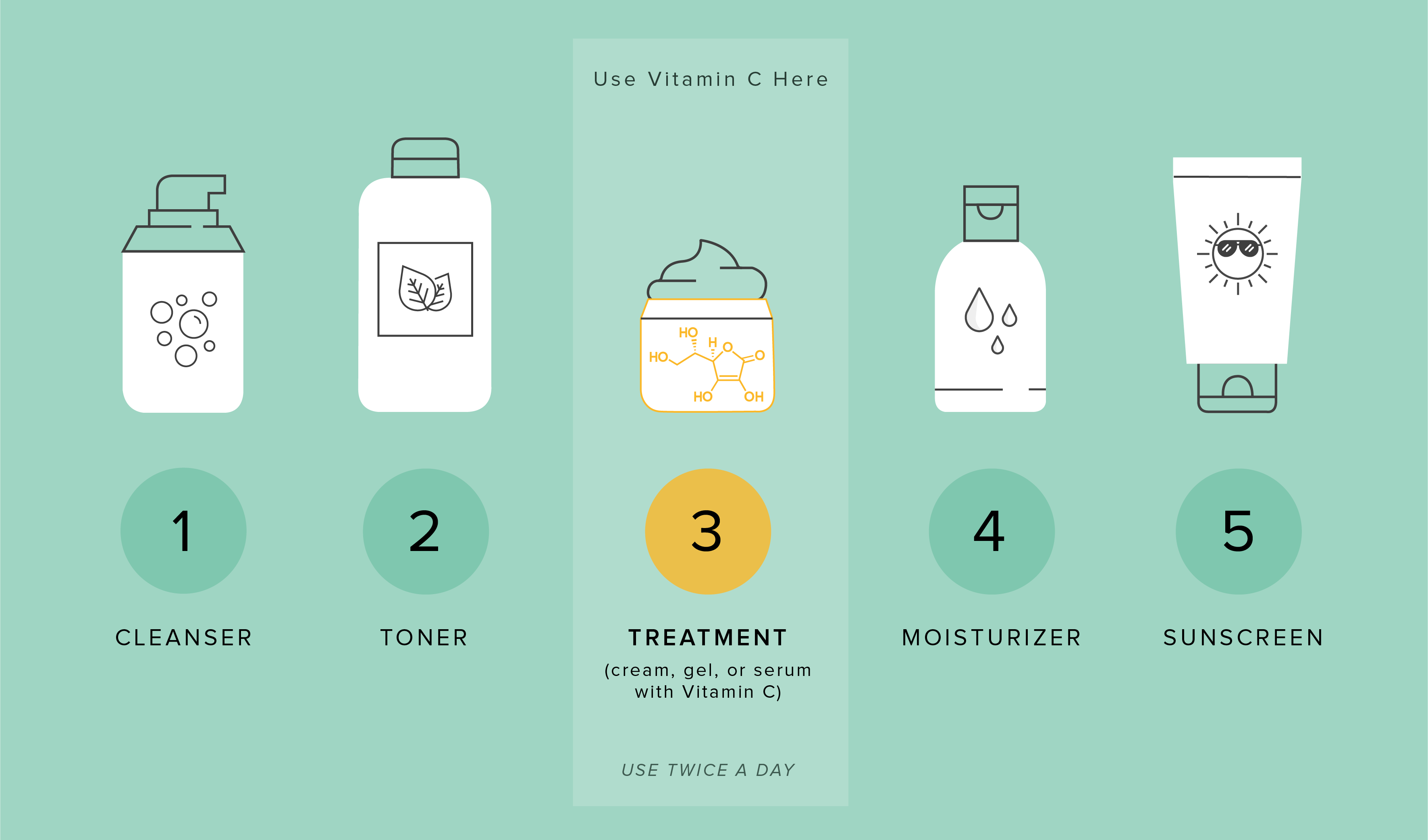Vitamin C is a popular ingredient in skincare. It offers many benefits for the skin.
Knowing when to use it in your routine can make a big difference. Using Vitamin C at the right time enhances its effectiveness. It helps brighten skin, reduce dark spots, and fight signs of aging. Many people wonder if they should use it in the morning or at night.
The answer depends on your skin type and other products you use. Understanding the best time for Vitamin C can help you get the most out of your skincare routine. This guide will explore the best practices for using Vitamin C. You’ll learn how to incorporate it into your daily regimen effectively. Your skin will thank you for it.

Credit: gethealthyskin.com
The Power Of Vitamin C
Vitamin C is a vital nutrient for our skin. It helps improve skin health in many ways. Many people include it in their skincare routines. Understanding its benefits can enhance your skincare results.
Benefits For Skin Health
Vitamin C brightens the skin. It reduces dark spots and evens skin tone. This vitamin also helps in collagen production. Collagen keeps the skin firm and youthful.
Regular use can lead to smoother skin. It may reduce fine lines and wrinkles. Vitamin C also hydrates the skin. Hydrated skin appears plump and healthy.
Antioxidant Properties
Vitamin C is a powerful antioxidant. It fights free radicals that damage skin. Free radicals come from pollution and UV rays. They can cause premature aging.
By neutralizing these free radicals, Vitamin C protects the skin. It helps maintain a fresh and vibrant appearance. Using products with Vitamin C can lead to glowing skin.
Morning Rituals With Vitamin C
Starting the day with Vitamin C can boost your skin’s health. This powerful antioxidant brightens your complexion and protects against environmental damage. Incorporating it into your morning routine is simple and effective.
Starting Your Day Right
Use Vitamin C serum as the first step in your morning skincare routine. Follow these steps for best results:
- Cleanse your face with a gentle cleanser.
- Pat your skin dry with a clean towel.
- Apply a few drops of Vitamin C serum.
- Gently massage it into your skin.
- Wait a few minutes before applying moisturizer.
Vitamin C helps brighten skin. It reduces dark spots and evens skin tone. Regular use leads to a fresh, youthful look.
Sun Protection Synergy
Vitamin C works best with sunscreen. It enhances protection against harmful UV rays. Use these tips for maximum benefits:
- Choose a broad-spectrum sunscreen with SPF 30 or higher.
- Apply sunscreen after your Vitamin C serum.
- Reapply every two hours when outdoors.
Using Vitamin C and sunscreen together boosts skin defenses. This combination fights free radicals and reduces signs of aging.
Make Vitamin C a part of your morning rituals. It’s an easy way to achieve glowing, healthy skin.
Nighttime Skincare Strategies
Nighttime is a perfect time for skincare. Your skin needs rest and repair after a long day. Using vitamin C at night can boost this process. It helps your skin recover and feel fresh.
Applying vitamin C before sleep allows it to work deeply. Your skin absorbs the nutrients better while you rest. This can lead to brighter skin by morning.
Enhanced Repair During Sleep
Sleep is a natural time for healing. During the night, your skin goes into repair mode. Vitamin C supports this process, enhancing skin recovery.
It fights free radicals that can harm your skin. By using vitamin C at night, you increase its benefits. Your skin looks healthier and more vibrant.
Pairing With Retinoids
Vitamin C works well with retinoids. Both are powerful ingredients for skin health. Using them together can improve your skincare results.
Retinoids help with cell turnover. They make your skin smoother and reduce fine lines. Vitamin C complements this by brightening the skin and fighting damage.
Apply vitamin C first, then add retinoids. This order maximizes the benefits of each product. Your skin will feel rejuvenated and refreshed.

Credit: wishtrend.com
Vitamin C Concentrations
Understanding Vitamin C concentrations is essential for effective skincare. Different concentrations can affect how your skin responds. Finding the right level ensures you get the most benefits.
Effective Dosages
The right dosage of Vitamin C helps your skin. Here are common concentrations:
| Concentration Level | Effectiveness | Skin Type |
|---|---|---|
| 5% – 10% | Good for beginners | Sensitive skin |
| 10% – 15% | Effective for most | Normal to combination skin |
| 15% – 20% | Highly effective | Oily skin |
| 20%+ | Strong, can irritate | Experienced users |
Navigating Concentration Levels
Choosing the right concentration is important. Here are some tips:
- Start Low: Use 5% to 10% if new.
- Monitor Skin: Watch for irritation signs.
- Increase Gradually: Move to higher levels slowly.
- Consider Your Skin Type: Oily skin can handle stronger doses.
Remember, too much Vitamin C can cause redness. Always patch test a new product. This helps prevent adverse reactions.
Ideal Skincare Combinations
Using Vitamin C in your skincare routine can enhance your skin’s health. It works best with certain other ingredients. Knowing these combinations can boost your skincare results.
Complementing Ingredients
Vitamin C pairs well with Vitamin E. Together, they protect against free radicals. This helps to reduce skin damage.
Ferulic acid is another great match. It stabilizes Vitamin C and enhances its effects. This combination offers powerful antioxidant protection.
Hyaluronic acid adds moisture. It hydrates the skin while Vitamin C brightens. This balance keeps skin looking fresh and plump.
Avoiding Negative Interactions
Avoid using Vitamin C with niacinamide. This combination can reduce the benefits of both. Instead, use them at different times.
Retinol and Vitamin C can be tricky together. They may irritate sensitive skin. Try using Vitamin C in the morning and retinol at night.
Be cautious with alpha hydroxy acids (AHAs). They can cause irritation when mixed with Vitamin C. Use them separately to keep your skin happy.
Skin Types And Vitamin C
Vitamin C is great for many skin types. It helps brighten the skin and fight aging. Choosing the right form of Vitamin C matters. Each skin type reacts differently. Knowing your skin type guides you in using Vitamin C correctly.
Tailoring To Your Skin
For oily skin, use a lightweight serum. This helps control oil and shine. Look for Vitamin C in gel or water-based forms. They absorb quickly and feel light.
Dry skin benefits from creamier formulas. Creams hydrate while delivering Vitamin C. Look for products with added moisturizers. This helps keep the skin soft and smooth.
Combination skin needs balance. Use a serum that suits both oily and dry areas. A Vitamin C product with a balanced formula works well.
Sensitive Skin Considerations
Sensitive skin requires special care. Choose a gentle Vitamin C option. Look for lower concentrations, like 10% or less. This reduces the risk of irritation.
Test new products on a small area first. This helps avoid reactions. Use Vitamin C every other day at first. Gradually increase use as your skin adjusts.
Avoid products with added fragrance or harsh ingredients. These can irritate sensitive skin. Seek out formulations designed for sensitive skin types.
Application Techniques
Using Vitamin C in your skincare routine is not just about choosing the right product. The way you apply it matters too. Proper application techniques can help your skin absorb Vitamin C better. This leads to better results. Here are some effective techniques to maximize its benefits.
Maximizing Absorption
To get the most out of Vitamin C, follow these steps:
- Cleanse your face thoroughly. Use a gentle cleanser.
- Pat your skin dry with a clean towel. Avoid rubbing.
- Apply a toner, if you use one. This preps the skin.
- Use a Vitamin C serum. Apply it while your skin is slightly damp.
- Gently massage the serum into your skin. Use upward motions.
- Wait a few minutes. Let it absorb fully before moving on.
Following these steps helps the skin absorb Vitamin C better. This ensures you get all the benefits.
Layering Products
Layering products correctly is essential. Here’s how to do it:
| Order of Application | Product Type | Purpose |
|---|---|---|
| 1 | Cleanser | Removes dirt and oil |
| 2 | Toner | Balances skin pH |
| 3 | Vitamin C Serum | Boosts brightness and fights aging |
| 4 | Moisturizer | Hydrates and locks in moisture |
| 5 | Sunscreen | Protects skin from UV rays |
Apply products in this order for best results. Each layer should absorb before applying the next. This keeps your skin healthy.
Product Selection And Storage
Choosing the right vitamin C product is essential. The quality of the serum matters. It impacts how well your skin benefits from the vitamin. Storage also plays a crucial role in maintaining its effectiveness.
Choosing Quality Serums
Start with serums that list vitamin C as the main ingredient. Look for ascorbic acid, the most effective form. Check the concentration. A level between 10% to 20% is ideal for most skin types.
Consider the packaging. Dark glass bottles protect the serum from light. Air-tight pumps help keep it fresh. Avoid clear bottles. They let in light and can reduce potency.
Read reviews from other users. Their experiences can guide you. Brands with a good reputation often provide better products. Don’t rush the selection process.
Preserving Potency
Store your vitamin C serum in a cool, dark place. Heat and light can break down the active ingredients. A bathroom cabinet or drawer is usually good.
Keep the cap tightly closed after use. This prevents air from entering. Air exposure can lead to oxidation. A discolored serum is often less effective.
Check the expiration date. Using expired products can harm your skin. If unsure about the potency, it’s best to replace it. Fresh products ensure you get the full benefits.
Tracking Skincare Progress
Tracking your skincare progress is key to seeing results. It helps you understand how your skin responds to Vitamin C. Observing changes can guide you in adjusting your routine. This section discusses two important aspects: monitoring skin changes and adjusting your routine.
Monitoring Skin Changes
Start by taking notes on your skin’s condition. Keep a simple skincare journal. Record daily observations. Look for changes in:
- Texture: Is your skin feeling smoother?
- Brightness: Does your complexion appear more radiant?
- Dark spots: Are they fading?
- Breakouts: Are you experiencing fewer pimples?
Take photos every few weeks. Compare them to see visible changes. Use a consistent lighting and angle for the best results.
Adjusting Your Routine
After monitoring your skin, it may need adjustments. Here are some tips for tweaking your routine:
- Increase Frequency: If your skin tolerates it, use Vitamin C more often.
- Change Concentration: Try a higher or lower concentration of Vitamin C.
- Combine Ingredients: Consider pairing with hyaluronic acid or SPF for added benefits.
- Skip Days: If irritation occurs, reduce usage to every other day.
Always patch-test new products. This will help avoid unwanted reactions. Your skin’s needs change over time, so stay flexible.

Credit: www.sassysouthernblonde.com
Frequently Asked Questions
When Should I Apply Vitamin C In My Routine?
Vitamin C is best applied in the morning. This timing helps to protect your skin from environmental stressors throughout the day. Additionally, its brightening properties work effectively when used with sunscreen, enhancing overall skin radiance and protection.
Can I Use Vitamin C At Night?
While Vitamin C is most effective in the morning, you can use it at night too. Nighttime application allows it to work without interference from sunlight. If you prefer a nighttime routine, choose a stable formula to maximize its benefits during your skin’s repair phase.
How Often Should I Use Vitamin C?
Start with using Vitamin C serum once daily. As your skin adjusts, you can increase to twice daily if desired. Consistency is key for achieving optimal results, such as improved brightness and reduced signs of aging.
Is Vitamin C Safe For All Skin Types?
Yes, Vitamin C is generally safe for all skin types. However, sensitive skin may experience irritation. If you have sensitive skin, start with a lower concentration and gradually increase. Always patch-test new products to ensure compatibility with your skin.
Conclusion
Using vitamin C in your skincare routine can brighten your skin. Apply it in the morning for best results. This helps protect your skin from daily damage. Always follow up with sunscreen. Consistency is key for seeing improvements. Pay attention to how your skin reacts.
Adjust your routine as needed. Overall, vitamin C can be a great addition to your skincare. Enjoy the glow and healthy skin it brings.







